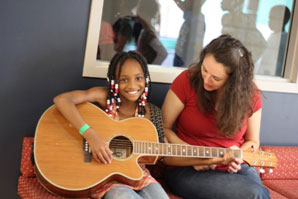Become a supermodel of health for your loved ones.

Do As You Say
Younger kids may not be able to define “hypocrite,” but they certainly recognize dishonest behavior. If such conflicting behavior becomes frequent, the cheating (and hypocrisy itself) will eventually be viewed as acceptable.
As adults, we have a hard enough time reconciling contradictions. Kids, however, don’t have the same frame of reference. Parents who snack on junk food absentmindedly in front of the TV have a harder time making their children understand why this behavior is unhealthy. In these cases, our words fail to align with our actions.
Tips:
- Commit to screen-time changes as a whole family
- Empower kids to identify their own healthy limits
- Sign a family use agreement that states clear expectations
- Be fair to all involved.
Say As You Do
Researchers warn of a growing “word gap” in early childhood development, particularly among lower-income families. Children rely on interactions with trusted adults to help build their vocabularies, and simple “adult” conversations with a kid can be an incredible trust and relationship builder.
On the other hand, though screens may be easy and accessible, they offer very little interactivity or benefit to young children. In fact, according to the American Academy of Pediatrics, screen time should be discouraged for children under two.
Tips:
- Engage your kids in everyday tasks, explaining each step as you go
- Leave open-ended opportunities to include the kids in the conversation
- Ask them to describe their experience
Small Steps toward Great Leaps
Screen time and healthy lifestyle concerns will only continue to grow as we become a more wired and inactive society. Small habit changes today can create a positive ripple effect for generations to come. Perhaps these changes can convert today’s childhood obesity concerns into tomorrow’s healthy youth development celebrations.
Tip:
- Check out Mayo Clinic’s tips for managing healthy family screen time